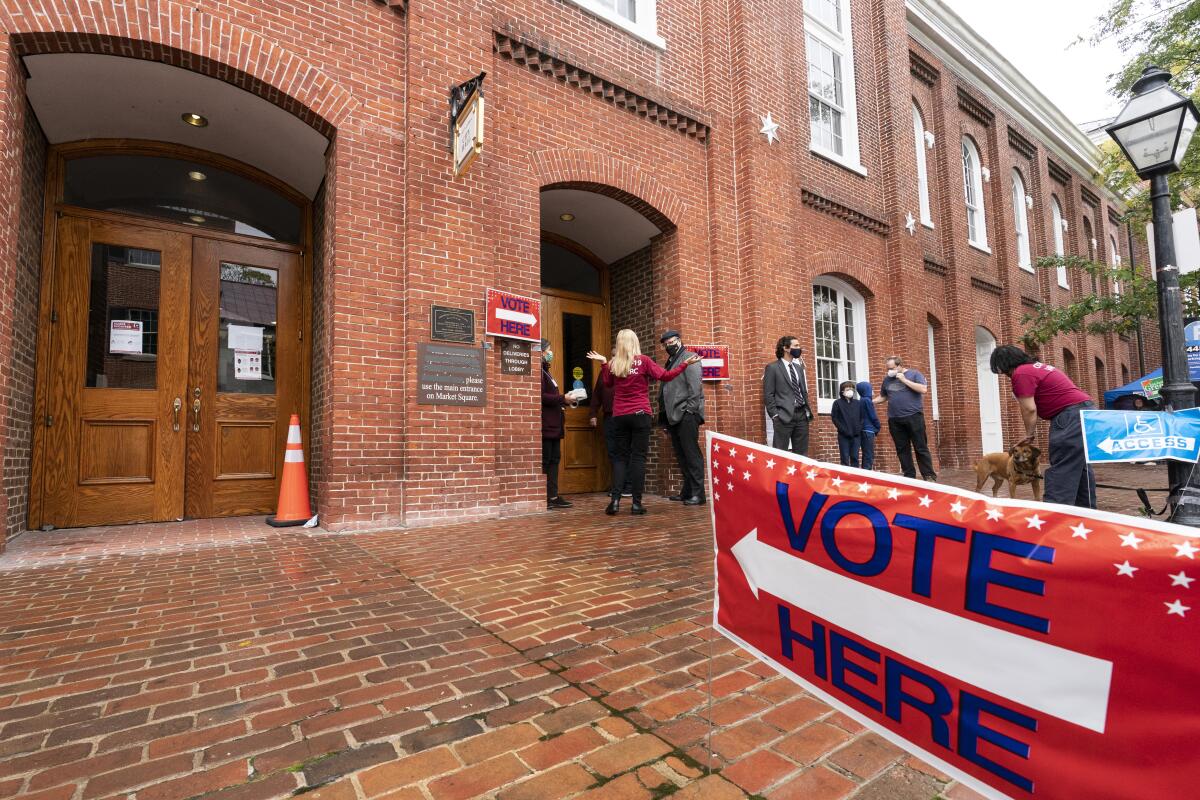Voter distrust likely to continue despite another smooth election

- Share via
ATLANTA — The first major election day following a year of relentless attacks on voting rights and election officials went off largely without a hitch. Unlike in the 2020 presidential election, there have been no claims of widespread fraud, ballots emerging mysteriously in the dark of night or compromised voting machines changing results.
The relative calm was a relief to those who oversee elections, but will it matter to those who still contend falsely that last year’s election was stolen from former President Trump?
Election experts say even a smooth election cycle this year is unlikely to curb the distrust that has built up over the last year within a segment of the public. That has led to costly and time-consuming partisan ballot reviews, threats to election officials and new voting restrictions in Republican-controlled states.
“I’m extremely concerned that we’re not at the end of this,” said David Becker, a former U.S. Justice Department lawyer who now heads the Center for Election Innovation and Research.
“We’re not at the middle of this. We’re at the beginning of this, and nobody is addressing it particularly well right now, with the exception of the professional election officials who are keeping their heads down and doing their job.”
There has been no evidence of widespread fraud or other wrongdoing with the 2020 election, and those claims that were raised have been rejected by judges, election officials and Trump’s own attorney general. Nevertheless, two-thirds of Republicans believe that Joe Biden was not legitimately elected president, according to an Associated Press-NORC Center for Public Affairs Research poll conducted two weeks after Biden’s inauguration.
Can Texas ports relieve California’s logjam? Doubtful. It wouldn’t be the first time Greg Abbott has been wrong about the advantages of Texas.
Tuesday’s election featured problems typical of an election day that were quickly resolved: power outages, technical issues with equipment or too few ballots at particular polling places.
In New Jersey, confusion over the reporting of election results circulated on social media. The Republican gubernatorial candidate, Jack Ciattarelli, has yet to concede but said after the election that he did not want supporters “falling victim to wild conspiracy theories or online rumors.”
Before Virginia’s high-profile gubernatorial election, Trump had said in a statement that he was “not a believer in the integrity of Virginia’s elections, lots of bad things went on, and are going on.” Yet in his statement congratulating Republican Glenn Youngkin, Trump made no mention of fraud and credited his own supporters with the win.
Matt Masterson, a former top election security official in the Trump administration, noted that little changed between 2020 and this year in how elections are run in the U.S.
“These are the same systems, the same people, the same processes,” Masterson said. “Election officials did their job in 2020, and they did it again in 2021.”
When problems arose, they were caught quickly. The Ohio secretary of state took over administrative oversight of the state’s most populous county, home to Columbus, after it failed to properly update its poll books and allowed three people to cast ballots twice, far too few to affect the outcome of any race.
That elections are mostly running well hasn’t stopped Republican officials from making claims about election fraud to justify new voting restrictions even in places where Trump and Republicans won handily in 2020 and where election officials reported no problems.
Florida Gov. Ron DeSantis, a Trump ally, has called for a new state office to investigate election crimes. He also seeks new laws adding more restrictions to ballot drop boxes and increasing penalties for those who collect ballots for others.
“I am excited that with this legislation, our state will be able to enforce election violations, combat voter fraud and make sure violators are held accountable,” DeSantis said in a statement.
Mail voting was hugely popular last year amid the pandemic and helped drive high turnout this year in Virginia. And it was Republicans who did well on Tuesday in Virginia, where Democrats had expanded voting access in recent years. That included no longer requiring voters to provide an excuse to cast a mail-in ballot.
But GOP lawmakers still say rules around mail ballots must be tightened to address public concerns about fraud, even if there is no evidence it exists.
In Ohio, Republicans have introduced two bills seeking to rewrite state election laws. One calls for prohibiting off-site ballot drop boxes, eliminating a day of early voting and tightening the state voter ID requirement. The other goes even further — reducing early voting from 21 days to six, eliminating no-excuse absentee voting and banning drop boxes altogether.
Trump won the state handily in 2016 and 2020, but lawmakers behind the second bill cited the potential of fraud to justify their proposal.
State Rep. Bill Seitz, a Cincinnati Republican sponsoring the less stringent bill, believes Biden was legitimately elected but laments that the dispute over the 2020 election results makes it difficult to discuss voting issues rationally.
“This is what happens when you try to do something fair in an environment in which there is no fair,” he said. “The Democrats will be knee-jerk opposed to anything they see as restrictive of voting, and a contingent of Republicans will be opposed to anything they see as an added convenience on voting.”
Election officials said it was important to remind the public that there were no widespread problems with the 2020 election, which was declared the most secure in U.S. history by a group of federal, state and local election officials.
“This isn’t something that went wrong that we’re fixing,” said Colorado Secretary of State Jena Griswold, a Democrat. “This is something that went really right in 2020. We had the safest elections in America’s history, with record turnout among both Democrats and Republicans. And the lies are about that.”
Falsehoods surrounding the 2020 election also triggered death threats against election officials that continue even a year later.
Michigan Secretary of State Jocelyn Benson described what the nation is confronting as a “five-alarm fire” and called on industry and community leaders to help defend democracy.
“Those trying to dismantle democracy have shown us again and again that there may be no bottom to where they will go to lie and deceive voters,” said Benson, a Democrat. “We must take them at their word and believe them, and get to work spending every day countering their lies with truth.”
More to Read
Sign up for Essential California
The most important California stories and recommendations in your inbox every morning.
You may occasionally receive promotional content from the Los Angeles Times.










